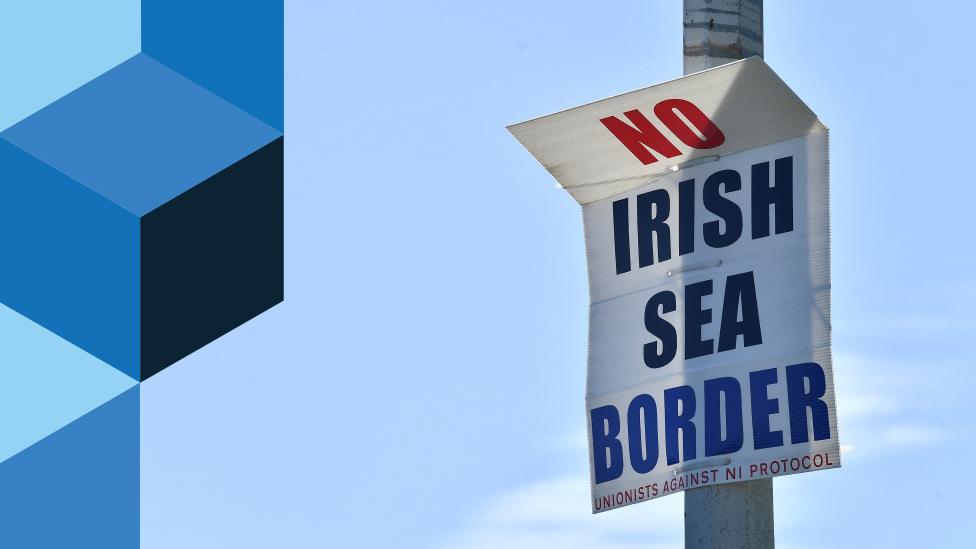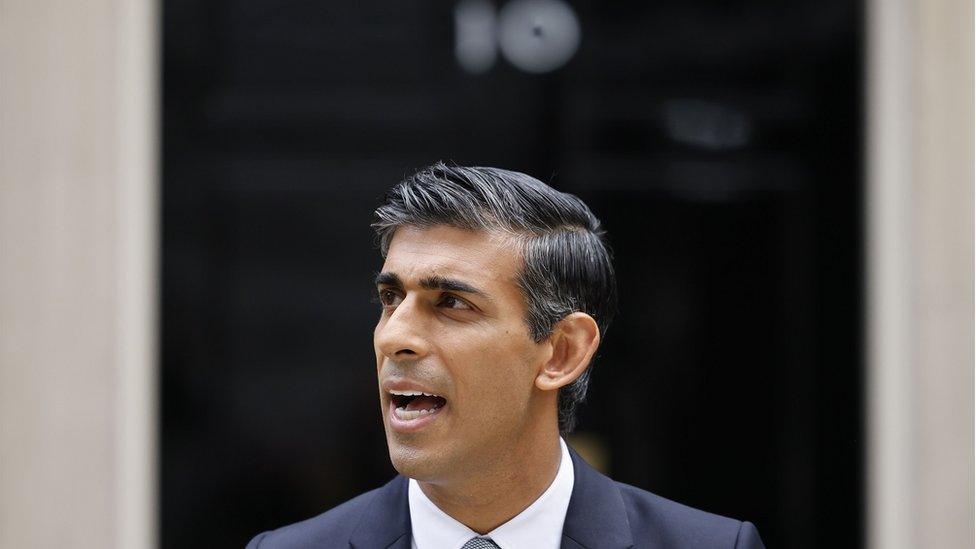Rishi Sunak: Where does the new PM stand on the NI Protocol?
- Published

Many Conservatives want to see changes to the Northern Ireland Protocol
Boris Johnson promised to "Get Brexit Done" but his successor inherited a bogged-down dispute about special arrangements that were agreed for Northern Ireland.
Liz Truss lasted just 49 days in office, during which time talks with the EU restarted.
Now Rishi Sunak has the keys to 10 Downing Street, he too will face the ongoing row over the Northern Ireland Protocol - part of the post-Brexit deal between the UK and EU.
Mr Johnson's government introduced a bill in Parliament which could override parts of the protocol - and make it easier for some goods to flow from Great Britain to Northern Ireland.
It was passed by the House of Commons and is currently being debated in the House of Lords.
If passed, the bill would not only affect the UK's relationship with the EU, but also rules for businesses in Northern Ireland and the future of Northern Ireland's devolved government at Stormont.
It collapsed in February after the Democratic Unionist Party (DUP) walked out in protest against the protocol, pledging not to return unless its concerns were addressed.
So where does Mr Sunak stand on the protocol?
What is the Protocol?
The Northern Ireland Protocol keeps Northern Ireland in the EU's single market for goods, preventing a hard border with the Republic of Ireland.
But it means new checks and controls on commercial goods which come into Northern Ireland from other parts of the UK, creating a trade border in the Irish Sea.
It is opposed by Northern Ireland's unionist parties, who say it undermines their place in the UK.
Other parties - including Sinn Féin, Alliance and the Social Democratic and Labour Party (SDLP) - say the protocol is a necessary compromise to mitigate the effects of Brexit in Northern Ireland.
The treaty was signed by Boris Johnson in January 2020, as part of the Withdrawal Agreement.
The EU has put forward its own proposals to ease checks, insisting a wholesale renegotiation is neither possible nor necessary.
For the first time since February, meaningful talks between Brussels and London got under way in early October.
It's understood progress is being made in some areas, such as trade data, but both sides are deliberately keeping discussions low key.
Rishi Sunak's view

Rishi Sunak faces a big in-tray in Downing Street
Mr Sunak has previously been critical of the protocol and garnered recent endorsements from high-profile Brexiteers in the Conservative Party.
However it has also been suggested that he favours a more conciliatory approach than some more hard-line Eurosceptic Tory MPs.
In May, Mr Sunak told Bloomberg the way the protocol was operating was posing enormous challenges to "the stability of the situation" in Northern Ireland.
He said it had become a barrier to re-establishing power sharing at Stormont.
Mr Sunak said the government's preference was a negotiated settlement and added that he wanted to ensure Northern Ireland's place in the United Kingdom was secure.
At the end of 2021, the Daily Telegraph reported that Mr Sunak urged Boris Johnson and his former chief Brexit negotiator Lord Frost not to "blow up" talks with the EU about the protocol.
The paper said Mr Sunak raised concerns over the potential impact this would have had on the economy and that he did not have the same sense of "urgency" as others in cabinet about dealing with the protocol.
The Treasury, Mr Sunak's ministry at the time, declined to comment.
He did not vote on the protocol bill at its second reading but he later voted in favour at its third reading.
After initially backing a return for Boris Johnson, Northern Ireland Secretary Chris Heaton-Harris, a strong supporter of Brexit, supported Mr Sunak's bid for prime minister, and on Tuesday he was reappointed as secretary of state.
Mr Sunak also garnered the support of prominent Eurosceptic and former chairman of the European Research Group Steve Baker, a junior minister at the Northern Ireland Office before the reshuffle.
Rishi Sunak only made his first visit to Northern Ireland in the summer, attending the Tory leadership hustings at a hotel outside Belfast.
While he spoke briefly about wanting to renegotiate the protocol, there was zero detail during a half-hour Q&A and he has yet to be tested on virtually all policies relating to Northern Ireland.


Despite a view in Brussels that Rishi Sunak is more "pragmatic" than his two predecessors, there's not exactly a rush of joy at his arrival.
For one thing, diplomats are waiting to see whether this government can actually manage to stay in power, given the recent volatility.
If it can, officials aren't sure what they'll get from Mr Sunak, who backed Leave in the 2016 referendum.
There's a belief he won't want the protocol dispute to escalate into a trade war, given his emphasis on economic stability.
But there's also a fear he may still pursue a hard-line approach because of pressure from Eurosceptic Tory MPs.
Talks on how to fix issues with the protocol have been quietly bubbling along in recent weeks. And while the UK's tone did markedly soften, if you look at their purest demands it still appears impossible the EU would agree to them.
All the while, the controversial Northern Ireland Protocol Bill continues its passage through parliament.
It's part of Britain's twin-track approach; trying to re-write the treaty through talks with a back-up plan of unilaterally changing the rules if those talks don't work out (although some critics see the bill more as a crass, albeit high stakes, negotiating tactic).
But the faster that bill moves through parliament, the faster we head towards this row hotting up again.
If the legislation however gets conveniently stuck, discussions between the two sides could drag on accordingly.
The other alternative is a breakthrough in negotiations but that will, in the end, require some serious compromises, not to mention real focus from Mr Sunak who - if you go by his words on Downing Street - doesn't seem to have put this issue at the top of his in-tray.

The EU view
Brussels views the protocol bill as a clear breach of international law and has urged the UK to "step back" from its approach.
Senior EU figures have warned that Britain risks damaging trust as well as its reputation abroad.
The European Commission has launched legal action over Britain's alleged failure to implement parts of the treaty.
If the bill becomes law and ministers do start changing parts of the treaty, the EU has suggested it could also impose trade sanctions.
This is why you might have heard warnings of a possible "trade war".
UK access to the EU's Horizon research programme has also been described as collateral damage in the dispute. There is currently a block on the UK re-joining the £81.2bn funding scheme.
- Published2 February 2024
